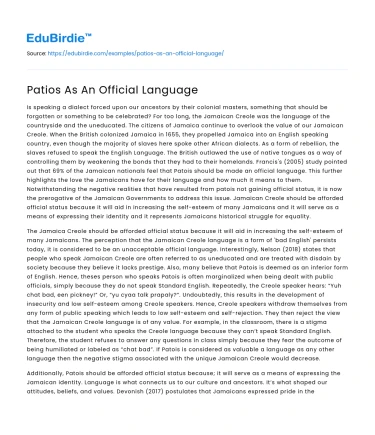Is speaking a dialect forced upon our ancestors by their colonial masters, something that should be forgotten or something to be celebrated? For too long, the Jamaican Creole was the language of the countryside and the uneducated. The citizens of Jamaica continue to overlook the value of our Jamaican Creole. When the British colonized Jamaica in 1655, they propelled Jamaica into an English speaking country, even though the majority of slaves here spoke other African dialects. As a form of rebellion, the slaves refused to speak the English Language. The British outlawed the use of native tongues as a way of controlling them by weakening the bonds that they had to their homelands. Francis's (2005) study pointed out that 69% of the Jamaican nationals feel that Patois should be made an official language. This further highlights the love the Jamaicans have for their language and how much it means to them. Notwithstanding the negative realities that have resulted from patois not gaining official status, it is now the prerogative of the Jamaican Governments to address this issue. Jamaican Creole should be afforded official status because it will aid in increasing the self-esteem of many Jamaicans and it will serve as a means of expressing their identity and it represents Jamaicans historical struggle for equality.
The Jamaica Creole should be afforded official status because it will aid in increasing the self-esteem of many Jamaicans. The perception that the Jamaican Creole language is a form of 'bad English' persists today, it is considered to be an unacceptable official language. Interestingly, Nelson (2018) states that people who speak Jamaican Creole are often referred to as uneducated and are treated with disdain by society because they believe it lacks prestige. Also, many believe that Patois is deemed as an inferior form of English. Hence, theses person who speaks Patois is often marginalized when being dealt with public officials, simply because they do not speak Standard English. Repeatedly, the Creole speaker hears: “Yuh chat bad, een pickney!” Or, “yu cyaa talk prapaly?”. Undoubtedly, this results in the development of insecurity and low self-esteem among Creole speakers. Hence, Creole speakers withdraw themselves from any form of public speaking which leads to low self-esteem and self-rejection. They then reject the view that the Jamaican Creole language is of any value. For example, in the classroom, there is a stigma attached to the student who speaks the Creole language because they can’t speak Standard English. Therefore, the student refuses to answer any questions in class simply because they fear the outcome of being humiliated or labeled as “chat bad”. If Patois is considered as valuable a language as any other language then the negative stigma associated with the unique Jamaican Creole would decrease.
Save your time!
We can take care of your essay
- Proper editing and formatting
- Free revision, title page, and bibliography
- Flexible prices and money-back guarantee
Additionally, Patois should be afforded official status because; it will serve as a means of expressing the Jamaican identity. Language is what connects us to our culture and ancestors. It’s what shaped our attitudes, beliefs, and values. Devonish (2017) postulates that Jamaicans expressed pride in their culture and their language. In addition to this Belcher-Timme (2009) notes that the unique Jamaica Creole set it apart from other cultures, making Jamaicans “easily distinguishable from other cultures”. This simply means that the Jamaican Creole is the vessel that holds our Jamaican identity and heritage thus, it is worthy of respect and recognition. The Jamaican Creole is one of the most recognizable characteristics of the Jamaican people in pop culture, it fascinates other cultures. This is evident in our Folklore and reggae music, which is now recognized on an international level. If one is to translate folklore meaningfully into Standard English is difficult and impossible. Likewise, for the lyrics of reggae music. This simply means that the messages that are conveyed in the reggae music and folklore would not be as effective as the use of Jamaican Creole.
Furthermore, Belcher-Timme (2009) argues that Patois should be afforded official status because it represents Jamaicans historical struggle for equality. Also, his research pointed out that Jamaicans are very proud of the struggle that their ancestors have had to fight through and overcome, making patois a “staple of any true Jamaican”. The Jamaican Creole represents a group of people and what they stand for. Our oppressors are no longer holding us back on this, it is us. Patois is a pivotal element in preserving traditions and the past in Jamaica.
On the other hand, many opponents will argue that there is no reason to make patois another official language when students are already struggling to master Standard English in school. However, Nelson (2000) states that students are having difficulties with the English Language because they do not speak the English language frequently. If you ask a child who is about nine years old to perform the latest deejay music, he can reel off in a few minutes, not missing a beat or a word. Maybe he’s not that verse in school. However, the deejay communicated to him effectively, because they speak the same language, the Jamaican Creole. This is the core of the problem concerning the poor academic performance in English among Jamaica students. Also, (Pryce, 1997) believes that the reason students are having trouble with the English language is more a result of students not reading enough.
Additionally, others may argue that the Jamaican Creole becoming an official language is unattainable due to the lack of a spelling system. However, a unified and standard system that governs the use of the language can be created. When this is done, the Jamaicans will be able to learn the syntax, morphology, and phonetics of their language. This will make it easier for them to write the language.






 Stuck on your essay?
Stuck on your essay?

